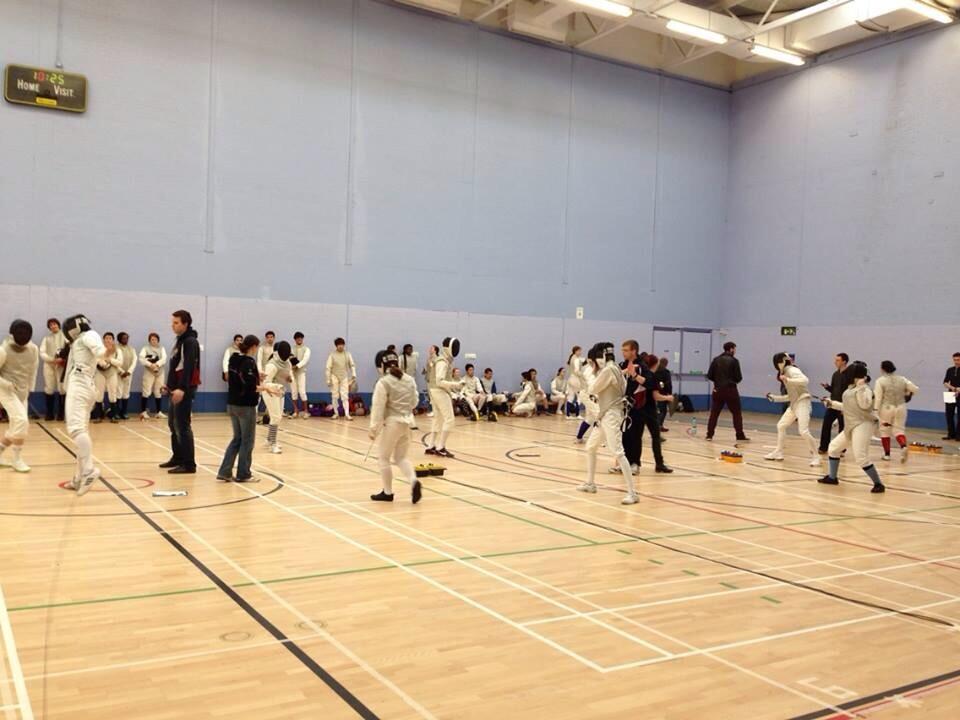Varnai triumphs in UK-wide Fencing contest
Warwick Sports Centre is a perennial hub of activity, hosting everything from dance classes to indoor football training, from swimming practice to circuit sessions.
What it rarely witnesses is a UK-wide fencing tournament including representatives from 11 universities. However, that was the case on Saturday 30 November in a tournament specifically for novices, where the only requirement is that participants must have taken up fencing less than two years ago.
Representatives from Keele, University College London, Cambridge, Imperial College London, Kent, Manchester, Southampton, Queen Mary, Bristol and Birmingham made the journey to the Midlands, and were rewarded with a spectacle full of intrigue.
In the women’s event, Warwick’s own Csilla Varnai proved too good for Idalina Baptista of Oxford, prevailing 15-6. Our university also thrived in the men’s sector, with Audion de Menibus finishing joint third.
Abdullah Garewal, who was the only competitor present from Queen Mary, won the men’s event, beating Cambridge’s Matteo Sbalzarini 15-8.
But how did the tournament work? That was a question I was asking myself as I walked in to the Main Hall to be greeted by a blur of flashing swords, jackets and electrical circuits.
Fortunately Vinesh Mistry, president of the Warwick Fencing club, was on hand to give me a crash course.
“In simple terms, if you stab the other person in the right place you get the point; if you win five points, you win the bout,” he said.
Mistry makes it sound so simple, and to the casual observer it is.
The silver jacket which all competitors adorn is called a lame (pronounced ‘la-may’), and hitting this jacket means the all-important sound of a beep and shining red light from the electric box.
Other areas – such as the head and legs – are out of bounds, and hitting these means a white light will flash.
In this tournament the competitors used swords known as foils, while epees and sabres can also be used.
But what separates the great fencers from the good?
“It’s as much a mind game as anything,” says Lily Isabelle, Novice Representative for Warwick Fencing.
Mistry agrees that instinct is more important than pre-planned strategy at a lower level.
“You could write a book on fencing strategy – in fact, people actually have,” he laughed.
“But at this level it doesn’t really matter. There’s little point in having a pre-determined strategy when you probably won’t know your competitor.
“But once you’re in the duel, there are things you can do. You look at how your opponents fence and learn intuitively. For example, one competitor might raise their arm pre-emptively, and you’ll know they’re about to attack.
“Once you become really good, you go on the British Fencing Association (BFA) website where your statistics can be looked up. Then people learn what you do and how you do it before they fight you.”
Referee Oliver Jennings admitted that “for a beginners’ competition, the standard was really good”
Warwick Fencing train twice a week and have been fortunate enough to benefit from the coaching of Professor Peter Cormack, who has represented Great Britain in several fencing competitions – including two appearances at the prestigious Fencing Masters World Championships.
And it is clear that the excitement is spreading well beyond the club’s exec. Third-years Marjorie Adriaenssens and Ellie Adams positively exuded excitement as they spoke to me after the pool stages.
Adams finished 25th out of 30 competitors, a creditable return, while Adriaenssens came ninth after a superb debut performance.
“It’s been fun. We were both a little bit nervous, but also really looking forward to it,” Adriaenssens enthused.
“It’s been much more fun than we expected. It’s a good experience.”
Referee Oliver Jennings, a PGCSE student at Warwick, admitted that he was hugely impressed by the standard of novices.
“For a beginners’ competition, the standard for the finals is really good,” he said.
It seems strange that a university-wide tournament, which Warwick always host, receives so little coverage.
“Perhaps it’s because it’s not a particularly well-known sport,” muses Mistry. “We’re really doing our best to raise the profile of the club.”
More events and performances like this should help to raise publicity for Warwick Fencing.
And after a weekend where our university finished first and third in the women and men’s competitions respectively, it is clear that there is genuine quality within one of Warwick Sport’s often-overlooked clubs.

Comments